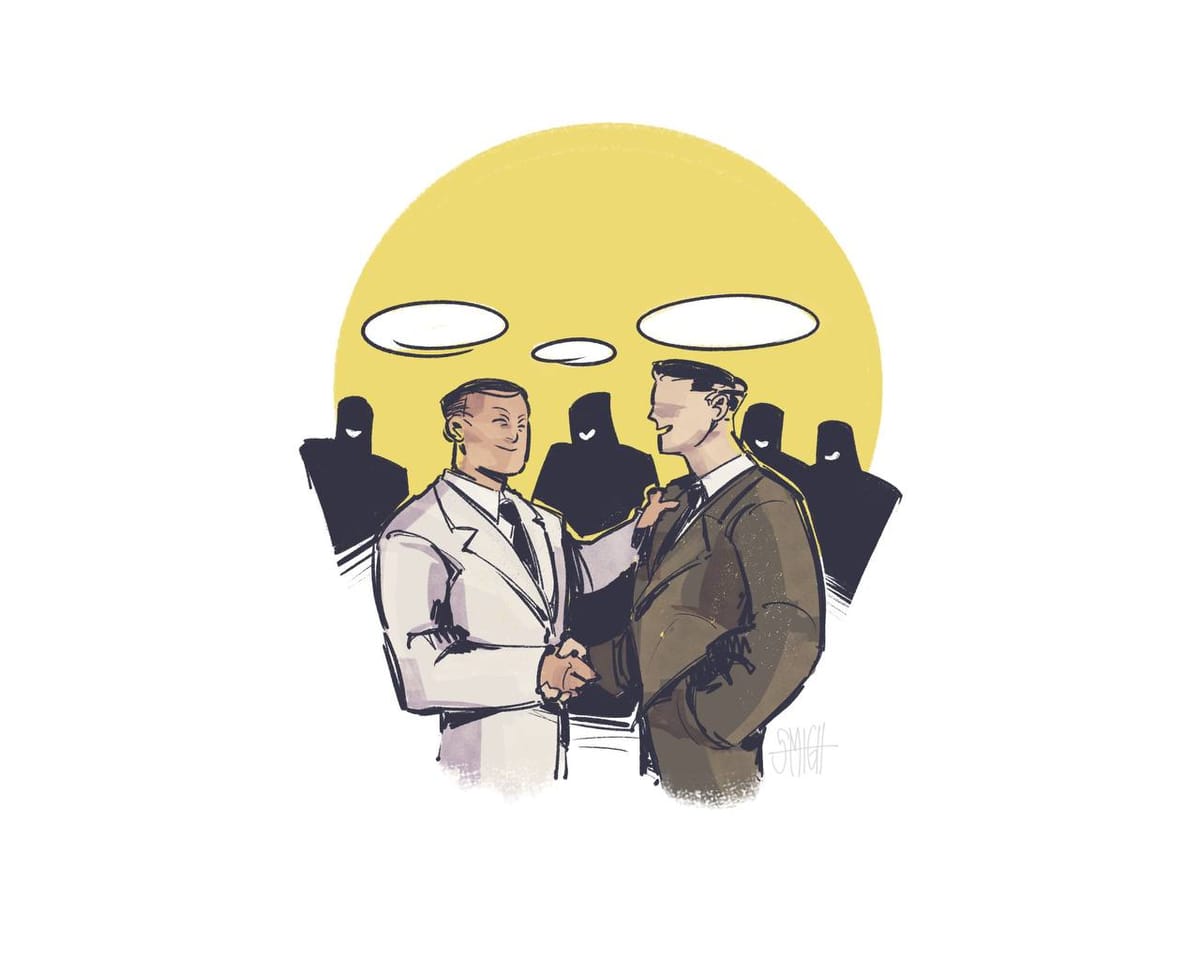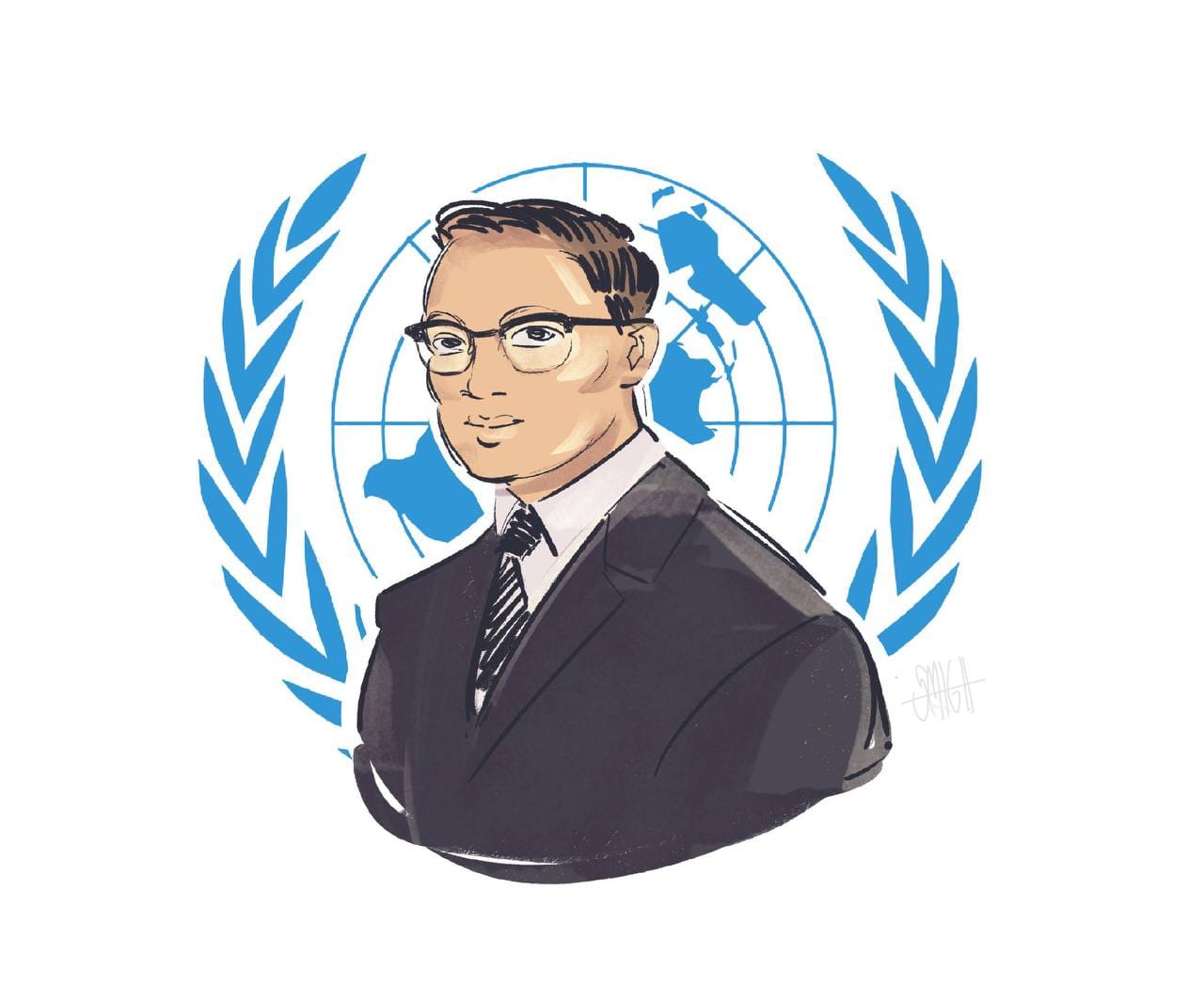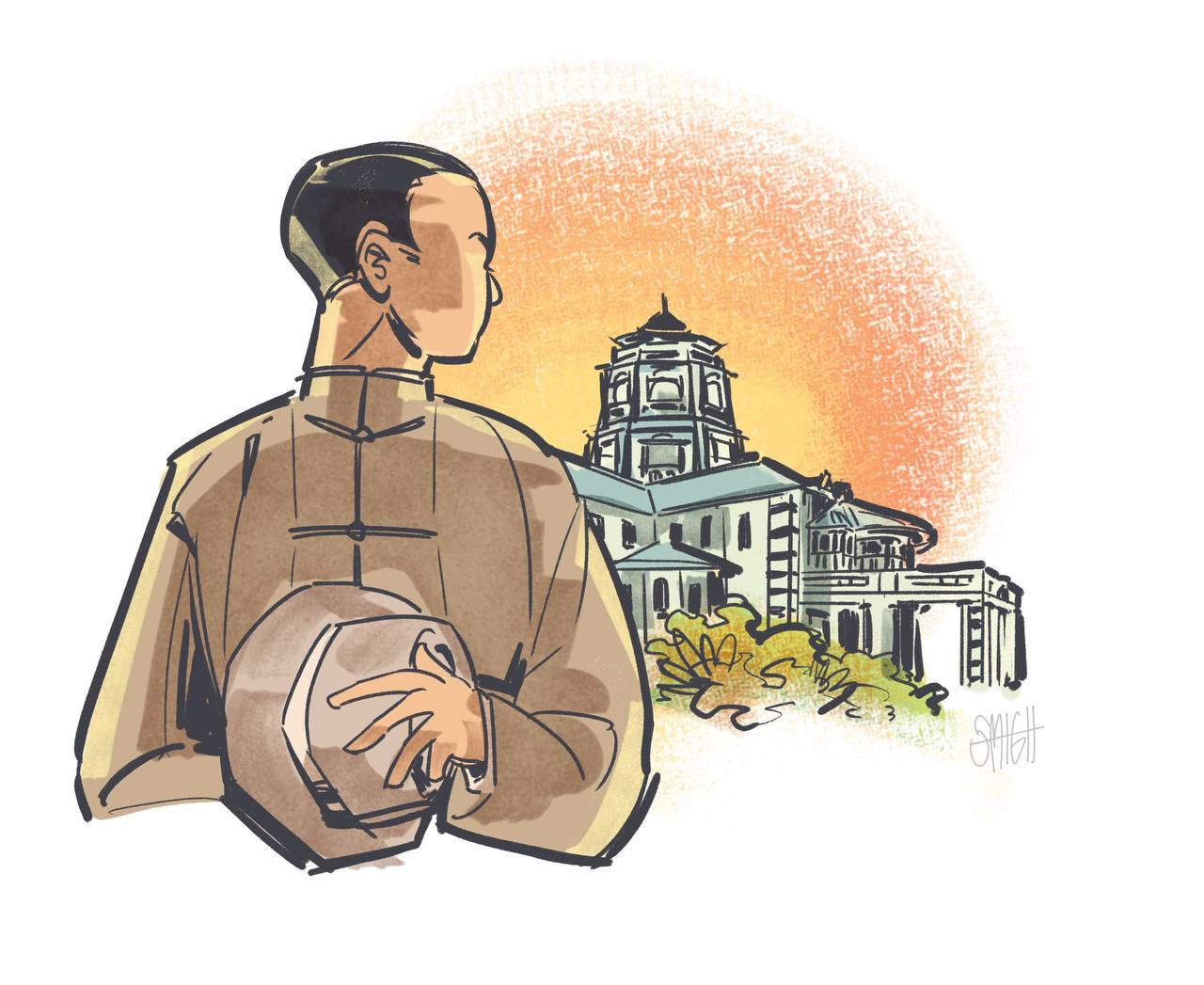
Among the wealthy Chinese businessmen in colonial Burma, Lim Chin Tsong, Chan Ma Phee, and Aw Boon Haw were well-known names. Their fame came from their established businesses and public philanthropy.
However, there was a unique businessman who stood out differently among the colonial political elite and Chinese, Indian, Karen, and Shan ethnic leaders. Though wealthy, he wasn't extraordinarily rich. His Chinese name was Aw Khe Chaung, and in Myanmar, he was known as U Sat Su.
U Sat Su - a name that has largely faded from memory in modern times. U Sat Su was a prominent Chinese businessman during the colonial period. He was well-versed in Myanmar culture, respected local customs, had keen business acumen, and notably, played his part in Myanmar's independence struggle, providing whatever assistance was requested by General Aung San.

Early Life
U Sat Su was born in Kweichow village, about an hour's boat ride from Amoy (now Xiamen) city, where the Thirty Comrades would later arrive in China. The village, situated northwest of a mountain range, was a poor community of about 1,000 households. The men of this village had a common story - they would go to Myanmar for work, some would become wealthy, and most would never return. The villagers had a saying: "The Buddha in Myanmar has greater power, and Myanmar women are more capable."
U Sat Su's parents were poor. In his youth, he studied Confucian literature. Later, when Dr. Sun Yat-sen led the revolution against the Manchu dynasty, and civil war broke out between northern and southern China, chaos ensued in Kweichow village. At that time, U Sat Su was only 14 years old, and like many before him, he wanted to work in Myanmar. The elders were reluctant but eventually gave in to his persistence.
U Sat Su had slept alongside his grandmother until he was 12. When he decided to leave for Myanmar at 14, his grandmother wept and gave him three important pieces of advice: (1) The Shwedagon and Kyaiktiyo Pagodas are powerful - make sure to pay homage to them, (2) Get along well with the Myanmar people, and (3) Return within 4 years, whether successful or not, and don't marry a Myanmar woman.
Journey to Myanmar at 14
U Sat Su arrived in Myanmar in 1915 via Penang during World War I. Before his departure, his teacher gave him books on 5,000 years of ancient Chinese history, which he carried in a gunny sack. He would continue to study these books and apply their teachings in his social relations until he was over 50 years old.
Upon arriving in Myanmar, he stayed in Pyi Twin village between Kyun Ma Nge and Labutta, where he worked at a Chinese shop owned by his relative. While working there, he fell in love with and married Ma Sein Khin (also known as Ma Ma Khin), who was four years his senior. After four years, his wife passed away.
Grieving, he worked as a rice broker in Pegu and Nyaunglebein for about five years. He then returned to Yangon and joined the Chinese Association as a member. U Sat Su was young, energetic, and business-savvy, which impressed the Chinese elders. Committee elder U K Ba Gyi helped introduce him to prominent Myanmar figures. One day, he helped organize the wedding of Tan Yu Kin, a Chinese Association member. At this event, which was attended by knighted U Ba U, U K Ba Gyi gave him the Myanmar name "U Sat Su." Thus, his original name Aw Khe Chaung faded away, and he became known as U Sat Su. Notably, while many Myanmar people were adopting English names during British rule, he chose to adopt a Myanmar name instead of his Chinese one.
Business and Social Life
By 1934, U Sat Su ventured into the silk business, traveling to Mandalay for silk trading. In 1938, he returned to rice brokerage.
During the Japanese invasion in 1941, he helped establish the Chinese National Bran Hap Bwe Association along with other Chinese nationals to avoid persecution by the Japanese. He served as the association's Communications Officer - what would today be called a Communications Officer.
U Sat Su and Lanmadaw Pho Htoke
As his wealth grew, U Sat Su established the Lan Taung Company. He then planned to open a hotel at the corner of Dalhousie Road (now Maha Bandula Road) and Lanmadaw Road. At that time, Pho Htoke of Lanmadaw was a notorious gangster. U Sat Su went to inform Pho Htoke about his plans to open a hotel. Pho Htoke granted permission and offered protection. Thus, the Lan Taung Hotel was established, where Pho Htoke and his associates would frequently dine.
U Sat Su was well-connected, with friends among Chinese, Indian, Myanmar, and British communities. This helped his business flourish. He was particularly skilled at social relations, understanding people's preferences, and practicing patience while respecting Myanmar customs and traditions. From police officers to General Aung San, everyone knew him. He maintained close relationships with Chinese tycoons, Karen leaders, Shan Sawbwas, independence fighters, and future leaders like Sao Shwe Thaik, Man Win Maung, Dr. Ba U, and U Nu.

Social Gatherings and Hosting
U Sat Su frequently hosted dinner parties, meetings, and receptions. His hosting style followed the principles of social relations and character assessment from his Chinese history books. During these events, he took special care not to discuss alcohol in front of non-drinkers or serve it inappropriately. He meticulously remembered each guest's preferences and prepared accordingly. He would often provide transportation and personally escort non-drinking dignitaries like U Thwin, U Saw Hla Pru, and U Lon Baw home.
After returning, drinking sessions would continue until midnight, followed by poker games. Some would then get massages. U Sat Su was skilled at accommodating all types of people.
Fundraising for the Burma Army
The Chinese National Bran Hap Bwe Association, in which U Sat Su was deeply involved, significantly supported the Burma Independence Army (BIA). The association once donated 200,000 kyats and a car worth 100,000 kyats to the BIA.
In September 1944, the association was invited to a military office meeting regarding army funding. U Sat Su was a senior member of the association's army funding support committee. At the meeting, General Aung San spoke about the army's independence efforts. He then invited U Sat Su to speak. U Sat Su gave an impromptu speech about a queen from Chinese history who sacrificed everything for her country, using this story to encourage donations.
Later, when another funding request came, the association had only 700,000 kyats remaining. Association Chairman P.K. Chaung decided to donate 500,000 kyats to the Burma Army. When U Sat Su brought this amount to the military office, he found other organizations had donated more, with the highest being 800,000 kyats. Not wanting the Chinese association to appear less generous, U Sat Su pledged one million kyats, despite not having the funds.
He returned to his Lan Taung Hotel and devised a plan to raise the additional 500,000 kyats. He set up three gambling operations - dominoes, mahjong, and poker. Within a week, he managed to raise about 600,000 kyats and contributed the promised 500,000 kyats to the Burma Army.
The Kandy Conference Travel Expenses
In September 1945, when General Aung San and his colleagues needed to travel to Kandy for the treaty signing, U Sat Su visited the General's residence on Tower Lane and learned about their need for travel expenses.
He suggested seeking help from the wealthy Myanmar businessman Sir U Thwin through Myanmar Alin U Tin, knowing they had a good relationship. Thanks to this connection, Sir U Thwin immediately provided 10,000 kyats for travel expenses. The Chinese community also contributed 5,000 kyats, resolving the situation.

The Electoral Contest with General Aung San
In 1947, as elections approached, General Aung San retired from his military position to enter civilian politics and planned to contest from the Lanmadaw constituency.
Lanmadaw was Chinatown - one of many Chinatowns in the world. It was heavily populated by Chinese residents, bustling with markets, hotels, and opium dens. At night, it became a haven for criminals and prostitutes, particularly during the Japanese occupation.
A Chinese man named Aw Myoe Shwe also lived in Lanmadaw and had many connections there. Everyone knew him, and he planned to contest the election.
When U Sat Su learned of this, he consulted with Chinese elders. They disapproved of Aw Myoe Shwe competing against General Aung San, believing it would harm Chinese-Myanmar relations. They particularly felt that competing against General Aung San, who was respected nationwide, would not benefit the Chinese community.
U Sat Su organized a grand reception, inviting Chinese elders and Aw Myoe Shwe, where they collectively urged him not to compete against General Aung San. However, Aw Myoe Shwe refused to listen.
U Sat Su then searched for someone who could influence Aw Myoe Shwe. When found, this person convinced Aw Myoe Shwe to withdraw - though it was later revealed that the convincing involved physical threats.
Thus, through U Sat Su's intervention, General Aung San won the Lanmadaw constituency unopposed.
Shoes for the Burma Army
In 1945, as Japan's position weakened, the Burma Army prepared to revolt against them. During this time, shoes became crucial for the Burma Independence Army. General Aung San tasked U Sat Su with finding shoes, telling him to work with Colonel Ba Thin. This was during the Japanese occupation when everything was scarce - people had to use palm sugar in tea due to sugar shortages and faced severe clothing shortages.
U Sat Su located Chinese shoemakers and urgently commissioned shoes. They used up all available leather but still couldn't meet the required quantity. U Sat Su then managed to acquire more leather from Japanese warehouses at considerable expense. With this additional leather, they completed the shoe production, fulfilling General Aung San's request.
The Myanmar Sat Su
While U Sat Su did good deeds, he also engaged in some questionable activities. However, his misdeeds were limited to personal pleasure and business dealings. For the nation, U Sat Su lived as a true Myanmar citizen, contributing what he could to the independence struggle.
However, circumstances changed after independence. When General Ne Win seized power in 1962, he nationalized all Chinese and Indian-owned properties. In 1964, U Sat Su's Lan Taung Hotel was also seized.
Though U Sat Su was Chinese, not Myanmar, he contributed what he could to the nation. He followed Myanmar cultural practices, religious customs, and traditions. He lived according to the teachings from his Chinese history books, maintaining harmonious relations with Myanmar people. He was a good Chinese citizen who lived respectfully in Myanmar soil, which earned him both popularity and respect from Myanmar national leaders.
This is why U Sat Su's story remains beautiful - a tale of a Chinese national who loved, respected, and contributed to his adopted country.

Han Thit Eain (Y3A)
Read More:
 Build Myanmar - MediaY3A
Build Myanmar - MediaY3A
 Build Myanmar - MediaY3A
Build Myanmar - MediaY3A
Build Myanmar-Media : Insights | Empowering Myanmar Youth, Culture, and Innovation
Build Myanmar-Media Insights brings you in-depth articles that cover the intersection of Myanmar’s rich culture, youth empowerment, and the latest developments in technology and business.
Sign up for Build Myanmar - Media
Myanmar's leading Media Brand focusing on rebuilding Myanmar. We cover emerging tech, youth development and market insights.
No spam. Unsubscribe anytime.
Sign up now to get the latest insights directly to your mailbox from the Myanmar's No.1 Tech and Business media source.
📅 New content every week, featuring stories that connect Myanmar’s heritage with its future.
📰 Explore more:
- Website: https://www.buildmyanmarmedia.com/
- Facebook: https://www.facebook.com/buildmyanmar
- YouTube: https://youtube.com/@buildmyanmarmedia
- Telegram: https://t.me/+6_0G6CLwrwMwZTIx
- Inquiry: info@buildmyanmar.org
#BuildMyanmarNews #DailyNewsMyanmar #MyanmarUpdates #MyanmarNews #BuildMyanmarMedia #MyanmarNews #GlobalNews #TechNewsMyanmar #BusinessNewsMyanmar #Updates #Insights #Media
